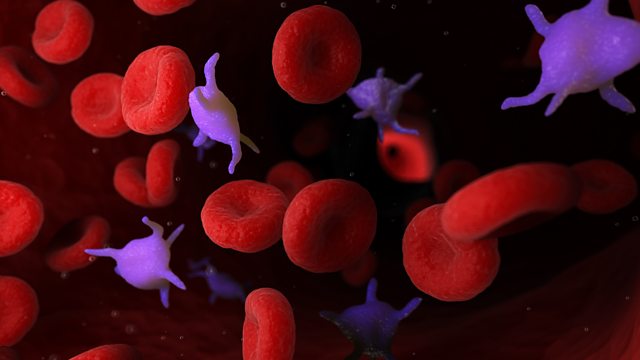On the trail of rare blood clots
As medical agencies look out for any further cases of an extremely rare blood clot in vaccinated people, we hear from the haematologist who identified one of the first cases.
On Wednesday the EUβs EMA and UKβs JCVI announced a suspected correlation between vaccination and an extremely rare type of blood clot. Prof Sabine Eichinger is a co-author of a new paper suggesting a link with vaccination or the immune response to Covid vaccination and suggests the name VIPIT for the condition. One of her patients died at the end of February having presented with a rare combination of symptoms β blood clots and a low blood platelet count. Sabine tells Roland the dots they have managed to join in the story so far.
Scientists at Fermilab in the USA posted four papers and announced an exciting development in particle physics that might lift the curtain on science beyond the Standard Model. Their measurement of something known as g-2 (βgee minus twoβ, just fyi), by measuring with phenomenal accuracy the magnetic properties of muons flying round in circles confirms a 20-year old attempt at a similar value by colleagues at Brookhaven. At the time, it was breathtaking but suspicious. Muons, rather like heavy electrons, donβt quite behave as the Standard Model might have us believe, hinting at fields and possibly particles or forces hitherto unknown. Dr. Harry Cliffe β a member of the LHCb team who found something similarly weird two weeks ago - describes the finding and the level of excitement amongst theorists worldwide.
Superfans around the world have learned to speak fluent Klingon, a fictional language originating from Star Trek. In a quest to understand the science behind these languages often dismissed as gobbledygook, Gaia Vince has been speaking to some of the linguists responsible for creating these languages. Itβs time for her to relax the tongue, loosen those jaw muscles and wrap her head around the scientific building blocks embedded in language and what languages like Klingon tell us about prehistoric forms of communication.
Meanwhile, primatologist Edward Wright of the Max Plank Institute has been hanging out with mountain gorillas in Rwanda and recording the sound of their βchest clappingβ. As he describes in the journal Scientific Reports his work confirms what scientists have long suspected - that the famous gesture - often portrayed in films - is a measure of size and strength - allowing communication in the dense, tropical forests in which the animals live.
Image: Platelets, computer illustration. Credit: Sebastian Kaulitzki /Science Photo Library via Getty Images
Presenter: Roland Pease
Producer: Alex Mansfield
Last on
More episodes
Broadcasts
- Thu 8 Apr 2021 19:32GMTΒιΆΉΤΌΕΔ World Service
- Fri 9 Apr 2021 04:32GMTΒιΆΉΤΌΕΔ World Service Americas and the Caribbean, Australasia, South Asia & East Asia only
- Fri 9 Apr 2021 08:32GMTΒιΆΉΤΌΕΔ World Service
- Fri 9 Apr 2021 12:32GMTΒιΆΉΤΌΕΔ World Service Australasia, UK DAB/Freeview, News Internet, Europe and the Middle East & Online only
Podcast
-
![]()
Science In Action
The ΒιΆΉΤΌΕΔ brings you all the week's science news.


